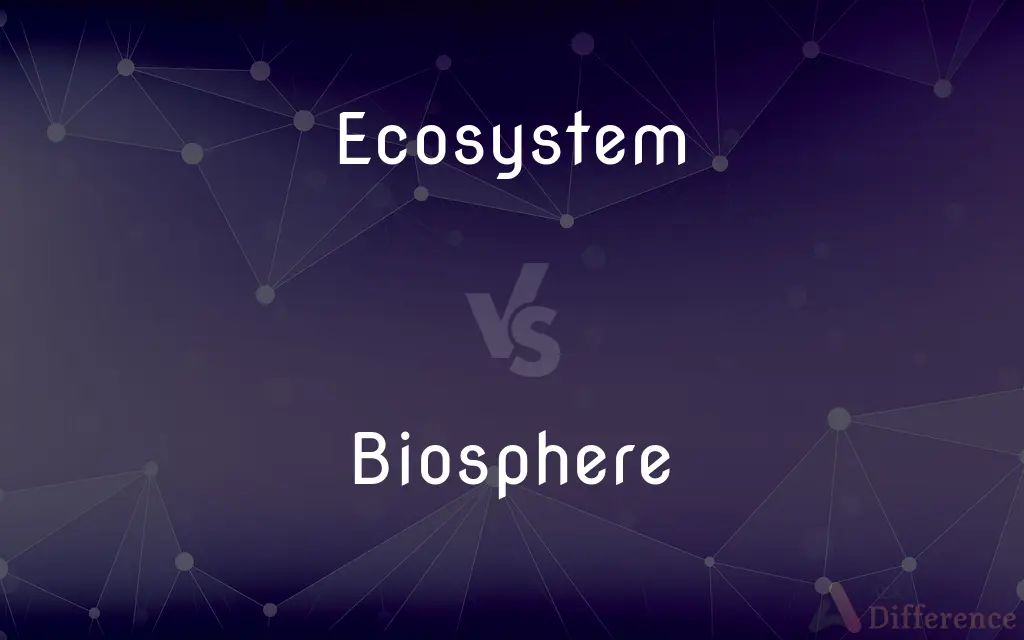Ecosystem vs. Biosphere — What's the Difference?
By Maham Liaqat & Urooj Arif — Updated on April 25, 2024
Ecosystem refers to a community of living organisms interacting with their environment, while a biosphere encompasses all ecosystems globally, representing Earth's life-supporting zone.

Difference Between Ecosystem and Biosphere
Table of Contents
ADVERTISEMENT
Key Differences
An ecosystem is a localized community of living organisms along with non-living components such as air, water, and mineral soil, interacting as a system. These interactions occur within a specific area, forming a unit that functions together. On the other hand, the biosphere is much broader, comprising all of Earth's ecosystems. It includes all living beings and their relationships, extending from the deepest ocean floors to the highest mountain peaks.
Ecosystems vary in size and can be as small as a pond or as large as a desert. Regardless of their size, each ecosystem is a functional unit with its own microclimate and biological interactions. Whereas the biosphere is a global concept that includes the sum of all the planet's ecosystems, serving as the global ecological system integrating all living beings and their relationships.
In an ecosystem, energy flows and matter cycles enable the functioning of the community. These processes are crucial for the survival of the organisms within each ecosystem. In contrast, the biosphere influences and regulates the atmosphere, hydrosphere, and lithosphere, thereby playing a critical role in the global climate and ecosystem productivity.
Ecosystem conservation focuses on preserving the natural processes and biodiversity within a specific ecosystem, often targeting threatened or unique habitats. Meanwhile, biosphere conservation is geared towards global efforts, such as addressing climate change and protecting biodiversity at a planetary scale, which impacts all ecosystems on Earth.
Ecosystems are dynamic entities that can be subject to succession and other ecological processes that drive change within them. Conversely, the biosphere is a more stable concept, though it is affected by changes within individual ecosystems and global environmental changes like global warming.
ADVERTISEMENT
Comparison Chart
Definition
A community of living organisms and their physical environment interacting as a unit.
The global sum of all ecosystems, encompassing all life on Earth.
Scale
Can be very small or large, but is localized.
Global, encompassing the entire Earth.
Focus of Study
Specific interactions and processes within a particular area.
Global processes and interactions among all ecosystems.
Conservation Efforts
Targeted towards specific regions or types of ecosystems.
Global efforts affecting all types of ecosystems worldwide.
Stability
Subject to ecological changes and succession.
More stable, but impacted by global environmental changes.
Compare with Definitions
Ecosystem
A biological community of interacting organisms and their physical environment.
The Amazon rainforest is an ecosystem rich in biodiversity.
Biosphere
The global ecological system integrating all living beings and their relationships.
The biosphere is studied to understand global ecological balance.
Ecosystem
A system formed by the interaction of a community of organisms with their environment.
Coral reefs are marine ecosystems affected by ocean acidification.
Biosphere
Encompasses all ecosystems and living organisms on the planet.
Climate change has significant impacts on the biosphere.
Ecosystem
Any system of interlocking and interdependent relationships.
A suburban area can be seen as an ecosystem involving local flora and fauna.
Biosphere
The sum of all ecosystems, the planetary system supporting life.
Scientists study the biosphere to predict ecological futures.
Ecosystem
A complex network or interconnected system.
Urban ecosystems often include parks and natural areas alongside human development.
Biosphere
The part of the Earth where life exists, including land, sea, and air.
Pollution affects the biosphere's delicate balance.
Ecosystem
A functional unit in ecology comprised of both biotic and abiotic components.
Desert ecosystems are adapted to extreme temperatures and scarce water.
Biosphere
The zone of life on Earth, a closed (mostly self-regulating) system.
Human activities are causing measurable changes in the biosphere.
Ecosystem
An ecosystem (or ecological system) consists of all the organisms and the physical environment with which they interact. These biotic and abiotic components are linked together through nutrient cycles and energy flows.
Biosphere
The regions of the surface and atmosphere of the Earth (or other planet) where living organisms exist
Ecosystem
An ecological community together with its environment, functioning as a unit.
Biosphere
The biosphere (from Greek βίος bíos "life" and σφαῖρα sphaira "sphere"), also known as the ecosphere (from Greek οἶκος oîkos "environment" and σφαῖρα), is the worldwide sum of all ecosystems. It can also be termed the zone of life on Earth.
Ecosystem
A system formed by an ecological community and its environment that functions as a unit.
Biosphere
The part of the earth and its atmosphere in which living organisms exist or that is capable of supporting life.
Ecosystem
The interconnectedness of organisms (plants, animals, microbes) with each other and their environment.
Biosphere
The living organisms and their environment composing the biosphere.
Ecosystem
(by extension) A network of interconnected people or organisations that resembles a natural ecosystem due to the complex interdependencies.
The company’s ecosystem mainly comprises its supply chain, customers, end consumers and competitors.
Biosphere
The part of the Earth and its atmosphere capable of supporting life.
Ecosystem
A system formed by the interaction of a community of organisms with their physical environment
Biosphere
The totality of living organisms and their environment.
Common Curiosities
What is the main difference between ecosystem and biosphere conservation?
Ecosystem conservation is localized, focusing on specific regions; biosphere conservation is global, addressing planet-wide issues.
How large is the biosphere?
The biosphere extends from the deepest ocean floors to about 10 kilometers into the atmosphere.
Why is the biosphere important for Earth?
The biosphere regulates vital earth systems and supports all life forms, making it crucial for survival.
What defines an ecosystem?
An ecosystem is defined by the interactions between living organisms and their physical environment within a specific area.
Can an ecosystem exist independently of the biosphere?
No, ecosystems are integral parts of the biosphere and cannot exist independently.
What technologies are used to protect the biosphere?
Technologies like renewable energy and sustainable farming are employed to protect the biosphere.
How do ecosystems contribute to the biosphere?
Ecosystems contribute to the biosphere by maintaining local ecological processes that support life globally.
Can the biosphere be seen from space?
Yes, the biosphere, particularly aspects like forests and oceans, can be observed from space.
How does biodiversity vary between ecosystems and the biosphere?
Biodiversity is specific to ecosystems based on local conditions, while the biosphere encompasses all biodiversity.
What is the effect of ocean health on the biosphere?
Healthy oceans are critical for maintaining the biosphere’s balance, impacting climate, weather, and air quality.
What happens when an ecosystem is damaged?
Damage to an ecosystem can disrupt its functionality and reduce biodiversity, affecting overall ecological balance.
What role do humans play in the biosphere?
Humans impact the biosphere through activities like deforestation, pollution, and urban development.
What is the relationship between ecosystems and climate change?
Ecosystems affect and are affected by climate change; their health influences global ecological responses.
How do ecological disasters affect ecosystems and the biosphere?
Ecological disasters can devastate local ecosystems and have long-term impacts on the biosphere’s health.
How do scientists study ecosystems?
Scientists use tools like satellite imagery and field studies to understand ecosystems' structure and function.
Share Your Discovery

Previous Comparison
Ribeye vs. Striploin
Next Comparison
Cute vs. SweetAuthor Spotlight
Written by
Maham LiaqatCo-written by
Urooj ArifUrooj is a skilled content writer at Ask Difference, known for her exceptional ability to simplify complex topics into engaging and informative content. With a passion for research and a flair for clear, concise writing, she consistently delivers articles that resonate with our diverse audience.
















































